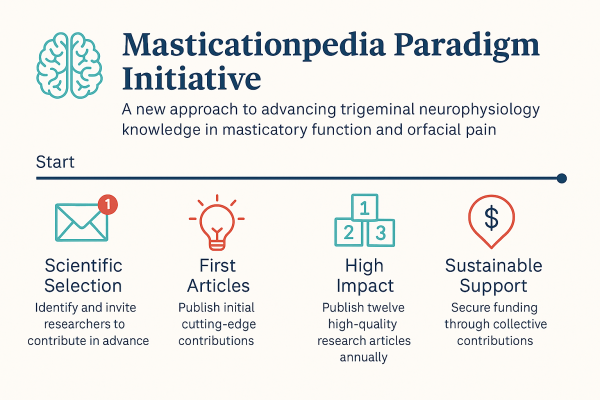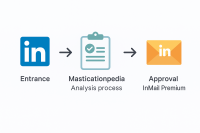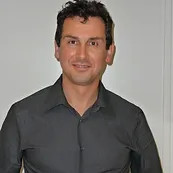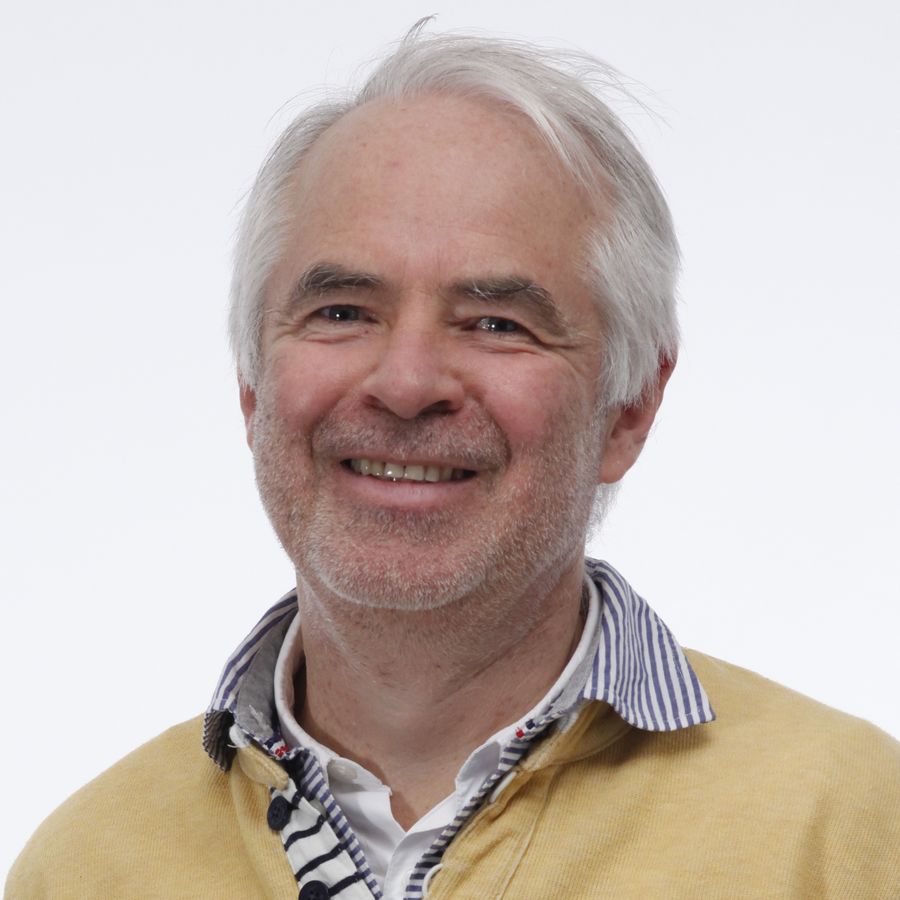Masticationpedia
Be part of the new generation of the Masticatory Science
You register as an Approved Expert using your LinkedIn profile. The team will send you the password to enter Member Entry.
Access the Reserved Area using the username and password sent to you. This function is reserved for members approved via LinkedIn.

What is Masticationpedia
Masticationpedia: is an innovative scientific-editorial project, born from the observation of significant clinical, scientific, editorial, and professional anomalies in the field of masticatory rehabilitation. Its mission is to address these issues in an open and constructive manner, proposing alternative and original solutions that aim to restore the full medical value to the dental profession, beyond any technical-artisanal approach.The project operates within a philanthropic framework, as an Anglo-Saxon Charity non-profit organization, committed to promoting culture, science, and innovation in the healthcare sector..... learn more📚 Scientific progress and paradigm shift
The progress of science – and, with it, the improvement of human quality of life – does not necessarily coincide with a gradual and incremental evolution, often driven by industrial dynamics. Sometimes, true advancement arises from a paradigm shift, fueled by the revolutionary power of human ingenuity.
🎯 The case of complex numbers and Fourier transforms
Modern Fourier transforms, now employed in very diverse fields, represent a progressive evolution of the concept of complex numbers. However, the conceptual breakthrough at its origin has roots much further back in time:
- As early as the 3rd century BC, Herophilos of Alexandria began to imagine numerical entities beyond the real.
- In 1545, with the publication of Gerolamo Cardano's Ars Magna, the explicit use of square roots of negative numbers appeared for the first time, albeit with the implicit suspicion of the term imaginary.
- In the following centuries, mathematicians like Rafael Bombelli, René Descartes (who coined the term imaginary), and Leonhard Euler formalized their use, transforming an abstract idea into a cornerstone of applied science.
🧭 From that revolutionary conceptual act, a long chain of mathematical and technical innovations has taken shape.
📌 Masticationpedia is situated within this same dynamic: not as a mere extension of existing knowledge, but as a paradigmatic project, capable of redefining the way clinical knowledge is conceived, modeled, and shared.
How to Participate
Reading Masticationpedia is open to everyone, but only verified LinkedIn members can actively shape the project.
1️⃣ Discuss chapters with peers – Comment on chapters, ask questions, and share clinical insights in a professional, moderated environment.
2️⃣ Join the Scientific Community – Become part of the Masticationpedia Scientific Community and of the future Bioethics Committee, helping to define priorities, criteria and ethical standards for new content and projects.
3️⃣ Contribute to chapters as an author – Help translate, correct and update chapters. When your contribution is integrated into a chapter, you are acknowledged as a co-author or contributor, with full authorship traceability.
This selective access via LinkedIn guarantees transparency, scientific quality and protection of intellectual contributions. .

The Book Index represents the beating heart of Masticationpedia. It is not a traditional encyclopedia, nor an editorial journal. Rather, it is a democratic and collaborative knowledge model, where only carefully selected professionals – recognized as authoritative voices in their scientific field – share their know-how with the community, whether scientific or broader.
🎯 Two fundamental principles
The project is distinguished by two essential characteristics:
- A coherent thematic direction: all contributions follow a precise conceptual track – the theme of complex masticatory rehabilitations – avoiding the random publication of disconnected articles. This approach ensures coherence, scientific continuity, and editorial credibility.
- A philosophical-paradigmatic function: each content aims to highlight the anomalies of clinical and scientific reality, offering a critical reading of existing paradigms and stimulating reflection and innovation.
🧭 A three-level structure
The Book Index is divided into three macro-areas, organized according to a path of increasing depth in scientific reflection:
🔹 Normal Science": describes the state of the clinical-scientific art in the pathophysiology of the masticatory system. It is the starting point for understanding the current context.
🔹 Crisis of Paradigm highlights the conceptual anomalies and methodological limits of conventional diagnostic models. Here, dogmas, validation criteria, and unsustainable clinical approaches are questioned.
🔹 Extraordinary Science: proposes new New clinical paradigms in the field of masticatory functions. It is the advanced laboratory where knowledge evolves and regenerates.

This step represents a fundamental stage in the professional's journey, endowed with a dual value: a formative component, and a distinctive one.
🎓 Formative value
Through the structured study of the contents present in the Book Index, the clinician consolidates an advanced know-how in the field of complex masticatory rehabilitations. This training is not limited to theory but translates into operational skills that range:
🔹 from the diagnosis of orofacial pain
🔹 to implant-prosthetic rehabilitations
🔹 to orthodontic and orthognathic multidisciplinary approaches
The result is an integrated, systemic training that connects pathophysiology to the therapeutic plan in a coherent and updated manner.
🔖 Distinctive value
At the same time, the clinical application of these contents translates into a 🎯 consciously neurophysiological professional practice. The professional who adopts this vision:
🔹 proposes treatments centered on the real physiology of the masticatory system
🔹 differentiates from conventional approaches still tied to obsolete or dogmatic schemes
Approved Members
Some approved members from LinkedIn profiles who are going to form the Scientific community.... ![]() 🔬 A paradigmatic approach Masticationpedia is inspired by the insights of Kuhn and Feyerabend: science sometimes advances in a non-linear, "anarchic" way without predefined authorities.
🔬 A paradigmatic approach Masticationpedia is inspired by the insights of Kuhn and Feyerabend: science sometimes advances in a non-linear, "anarchic" way without predefined authorities.
🎯 Targeted selectivity We seek professionals passionate about basic research and clinical-social innovation. To ensure authenticity, access is exclusively through a verified LinkedIn profile.
🤝 Authoritative community Approved members – renowned scholars with a critical spirit – form our Scientific Community. Only they will collectively decide which chapters to publish, surpassing the narrow model of traditional referees.
🧠 Innovative evaluation The review process, supported by a conceptual AI algorithm, neither definitively rejects nor approves but assigns each contribution a "specific weight" (low, moderate, high). The final decision always rests with the Community.
🌱 A gift to humanity When and if you decide to contribute, you will become part of this evolving project, designed for a shared and responsible evolution of knowledge.
Citation
❝
The theory is when we know everything but nothing works.
Practice is when everything works but no one knows why.
In our case, we always unite theory with practice: nothing works and we don’t know why.— Albert Einstein
Masticationpedia Projects
|
🩺 Why collective support for independent clinical research is needed Some patients, featured in the clinical cases collected in the Masticationpedia Book Index, have suffered for years due to misdiagnoses or missed diagnoses. In some cases, the suffering lasted for decades until a fatal outcome, without medicine – neither dental nor neurological – being able to provide a clinically sustainable explanation, let alone a cure. These patients did not have invisible diseases. They had complex problems, which lie at the intersection of dental occlusion, the neurophysiological system, and psychosomatic functions. Problems that conventional medicine, as it is structured today, is not able to address systemically. Routine dentistry does not possess – nor can it acquire on its own – advanced interdisciplinary neurophysiological know-how. In many cases, even the general neurologist does not fully understand the mechanisms of interaction between occlusion, trigeminal pain, and neuromotor behavior. This is why Masticationpedia was created. And this is why collective support is needed. — Masticationpedia Scientific Committee |
💡 Why Open Collective? Masticationpedia projects are not tied to private universities or industrial funding. They are built and shared by doctors, physicists, engineers, and researchers who collaborate voluntarily to produce predictive diagnostic models and useful clinical tools. The funds raised through Open Collective do not generate any profit for the founders. This is not an investment, nor a purchase. It is an ethical donation, with public and transparent reporting, in support of the clinical medicine of the future. — Masticationpedia Scientific Committee |







